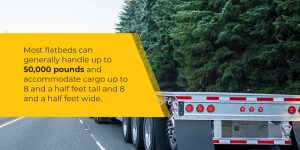
Transporting heavy equipment can sometimes be challenging, regardless of the distance you travel or the size of machinery you haul. Experienced operators must load and secure these machines to a trailer capable of accommodating each device. Besides preventing damage to your equipment and staying compliant with transportation regulations, choosing a suitable trailer is crucial for ensuring the safety of everyone on the road.
Failure to secure your load correctly could result in violations involving heavy fines. The Federal Motor Carrier Safety Administration within the Department of Transportation enforces strict cargo securement rules for transporting equipment. These rules apply to all types of cargo, including additional requirements for heavy equipment, machinery, and vehicles.
Learn more about the best types of trailers available and the factors you should consider before transporting heavy equipment.
There are several factors to consider before choosing the type of trailer you plan to transport your equipment, whether you’re a veteran hauler or a new operator just starting out. Several examples include:
Once you’ve addressed these four primary areas, you can look at some specific trailer models best suited to your needs. Although it’s common for many business owners and managers to want to buy a single trailer to fit all their requirements, it’s not possible in many cases. If you haul a diverse range of machinery or cargo, finding a new or used trailer to accommodate most of your needs is a good starting point for your initial purchase.
Flatbed trailers are one of the most versatile hauling options available, particularly if you have other transportation requirements besides heavy equipment. When secured properly, this equipment can safely transport anything from skid steer loaders to pipes and beams. Although flatbed trailers offer multiple tie-down points to secure your load, one of the most significant disadvantages is they require a crane or a forklift for loading since they don’t drop down.

Most flatbeds can generally handle up to 50,000 pounds and accommodate cargo up to 8 and a half feet tall and 8 and a half feet wide. They typically come in 48- or 53-foot lengths and are ideal for transporting smaller or compact models of construction equipment like:
Drop-deck trailers — also called step-deck trailers — are very similar to flatbed trailers, aside from having a second deck level. The higher, shorter level is closer to the towing vehicle and clears the tractor for a secure connection. This higher connecting level allows the lower level to be closer to the ground, offering an increased height capacity over most flatbed trailer models.
Step-deck trailers offer more convenient loading and unloading than flatbed trailers because of their proximity to the ground. Many drop-deck designs consist of an 11-foot well and a 37-foot deck. These models can typically accommodate equipment up to 10 feet high and 8 and a half feet wide.
Because of the increased height capacity, step-deck trailers are perfect for compact and mid-sized construction equipment such as:
Removable gooseneck (RGN) models are some of the best trailers for heavy-duty equipment because of their superior weight distribution. While many basic gooseneck models offer capacities of 50,000 pounds, specialized RGN models can transport up to 150,000 pounds to accommodate the heaviest types of construction equipment.
Lowboys are a type of gooseneck trailer that sits lower to the ground than any other trailer model, often as low as 24 inches above the pavement. Although the trailer well of a lowboy is typically shorter than most drop-deck models at 25-30 feet, it can handle equipment with heights of up to 11 and a half feet. Like drop-deck trailers, operators can utilize a lowboy’s upper level to store smaller materials that don’t fit inside the longer well space.
One of the most significant benefits of gooseneck trailers is their low proximity to the ground, offering trouble-free loading and unloading. Because a gooseneck’s hitch pivots when your commercial truck turns, it’s much more maneuverable than most flatbed or drop-deck trailers. The gooseneck’s long, curved neck is simpler to attach and detach to the towing vehicle.
RGNs are ideal for transporting heavier models of equipment like:
Many models of gooseneck trailers are available for specific applications, from flatbeds to car haulers to log gooseneck trailers. Many gooseneck trailer manufacturers also offer customization options like air-ride suspensions, anti-theft devices, hydraulic braking systems, and more.
If you’re still unsure which trailer model is perfect for your specific hauling operation, the knowledgeable and experienced team at Thompson Truck Source can assist you. We can help analyze your hauling requirements, including the payload and towing capacities you need to accommodate your heaviest loads. We feature new and used trailers for commercial trucks from some of the market’s most recognized brands.
In addition, we offer truck and trailer repair services, from preventive maintenance to axle alignment to wheel balancing. We strive to provide the fastest troubleshooting and diagnostic services from the moment you walk in the door. We also offer emergency field services inside our Alabama and Northwestern Florida service areas.
To learn more about the specific models of trailers we offer and how they can benefit your hauling operation, stop by one of our convenient locations, connect with us online, or call (205) 849-4361 today.